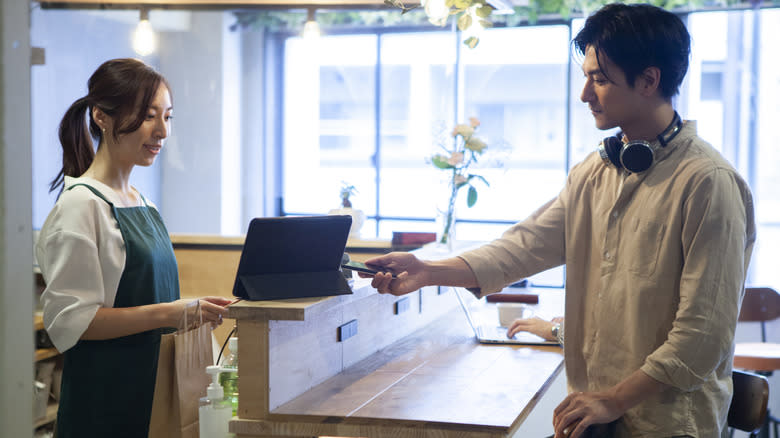The Rude Tipping Mistake You Should Avoid When Dining In Japan

Tipping is not a universal practice as anyone who's traveled to different countries can tell you, but the difference between Japanese and American tipping culture is as different as you can imagine. In the United States, tipping is practically required. The social stigma of leaving a restaurant or a bar without tipping is just shy of leaving without paying at all. If you make a habit of not tipping or tipping poorly, you're bound to regularly wind up in some very uncomfortable social situations. But that's not true in Japan. There, an extra tip after paying for goods or services is not just unexpected -- it's downright demeaning.
If you take a trip to Japan and think the local bartender is simply being polite when they turn down the extra yen, you are sorely mistaken. Japanese people will go out of their way to return the money to you and the conversation surrounding that act is going to be uncomfortable at best. There is a very narrow exception involving Japanese ryokan, which is a type of inn whose history dates back to the 8th century. But this exception is so specific and unrepresentative of Japanese tipping culture at large that you can and should ignore it unless you plan on visiting one.
The Japanese resistance to tipping will likely seem bizarre to many Americans. Perhaps you are imagining it is some sort of internalized servitude that exists as a remnant of the feudal class system that disappeared during the Meiji Restoration. Trust us, it's not.
Read more: Restaurant Foods That Always Taste Better Than What You Make At Home
Tipping Is Not Friendly In Japan, It's Disrespectful

Understanding why the Japanese feel the way they do about tipping would help to understand more about the controversial history of tipping in general. Tipping is a vestigial remnant of European aristocracy that made its way to the U.S. in the 19th century when wealthy Americans felt it was fashionable to imitate European aristocratic practices. In less flowery language, tipping is a way for rich people to flaunt their wealth while feeling good about themselves.
You may be aware that tipping has since disappeared from European countries, but it has unfortunately tunneled its way deep into American society. There were many people who opposed tipping culture in its early days. Some opposed it on the basis that it was essentially aristocratic (the antithesis of American egalitarianism) while others likely just didn't want to pay extra. Eventually, businesses started paying their workers less with the expectation that tips would fill the void. That practice has continued to this day even as the boundaries of tipping culture have remained frustratingly vague. But back to Japan.
In this light, Japanese resistance to tipping culture is no longer seen as a subservient attitude but an assertion of dignity. American workers do not normally take pride in their labor but Japanese people do and tipping comes across as belittling. It may feel like friendly generosity to you, but from a different perspective, it comes across as an assertion of social dominance and lack of respect.
Read the original article on Tasting Table

 Yahoo Lifestyle
Yahoo Lifestyle 
